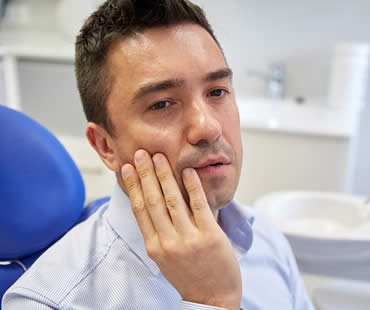
Nov 22, 2019 | Dental Topics 2, Root Canal Treatment, Blog
Root canal treatments are specifically designed to relieve the tooth pain associated with an infected tooth root. Patients come in with pain, and often leave the procedure with less discomfort than before. However, if you’ve recently had a root canal treatment on one or more of your teeth, you might be experiencing discomfort following the procedure. Fortunately, there are things you can do at home to take care of it.
Are your gums sore, tender or swollen surrounding the affected tooth? This is likely the result of the tiny metal clips that affix a rubber dam around the tooth, protecting it and protecting your mouth. The clips are attached along the gum line, and can leave tiny bruises or sometimes small cuts in the soft gum tissue. This pain should alleviate within two days of the treatment.
Is the tooth itself sore? This is a common occurrence and is typically the result of an inflammation of the mouth tissues that encase the tooth root. The tools used by the endodontist to perform the procedure can irritate the tissues.
Both of these types of pain can be dealt with by several over-the-counter analgesics. The ones that are most recommended to treat dental pain are those that possess anti-inflammatory agents: naproxen sodium, ibuprofen or aspirin, etc. If you are also taking narcotics prescribed by your dentist, do not take any further medication, over-the-counter or prescription, until you have checked with your dentist. Dangerous reactions can occur.
If you have been prescribed antibiotics, do not stop until you have completed each recommended dose. This ensures that your tooth remains free of infection and can heal thoroughly.
Ask your endodontist if you have other concerns about treating your post-root canal treatment pain.
We treat patients from Central Falls and the surrounding area

Jun 29, 2018 | Dental Topics 2, Root Canal Treatment, Blog
A toothache can ruin your life, at least until you have treatment that relieves the pain. Headaches, mouth pain, or inability to chew can all accompany a tooth problem. It is not unusual for tooth pain to be linked to tooth decay, and when it becomes advanced you just can’t ignore it. This is when root canal therapy is valuable.
What is the procedure?:
Root canal treatment focuses on the pulp cavity, which is the inside of the tooth. When the pulp is infected or inflamed, it needs to be completely removed from the tooth in order for it to heal. It doesn’t matter if the damage to the pulp results from severe decay, tooth fracture, faulty crown, repeated dental procedures, or trauma. Even if the damage isn’t visible or causing unbearable pain, the bottom line is that the interior of the tooth must be cleaned out, disinfected and sealed to prevent future infection. A crown is typically placed on top of the tooth to protect it and complete the procedure.
Why is it necessary?:
If left untreated, an infected pulp can lead to intense pain or spread to other parts of the body. Root canal treatment is the best way to save the tooth and restore its function. Other benefits of the procedure are maintaining the tooth’s natural look, protecting other teeth from excessive wear, restoring normal chewing ability, and allowing normal sensation and biting force.
How long does it take?:
The procedure is more routine than you might think. An experienced dental professional can complete the process is one or two appointments, depending on your specific case. Once the procedure is complete, your repaired tooth should last as long as the rest of your teeth.
We look forward to seeing you in our Central Falls dental office

Nov 27, 2020 | Dental Topics 2, Root Canal Treatment, Blog
If you suspect you have an infected tooth, you might wonder if root canal treatment might be in your future. Do you have another option? Yes! One such alternative has been in existence for decades, but has only recently come to be more effective due to advancements in materials. This process is called pulp capping.
Pulp capping can help patients whose root infections have not yet reached the tooth’s nerve. Root infections begin when bacteria enters the pulp of the tooth through a crack or a large cavity. In a standard root canal procedure, the pulp and nerve of the tooth is hollowed out, cleaned and sealed, typically with a crown restoration.
With pulp capping, the nerve is preserved and the tooth is often repaired with a filling instead of a crown. Pulp capping allows the dentist to clean and protect the pulp, defending it from infection with medicine. With a successful pulp cap, the dentin of the tooth begins to regrow over the pulp cap. Advancements in the sealants used during these types of procedures has allowed for a greater percentage of success.
If you have a toothache, it’s important to see your dentist immediately. Pulp capping has a narrow window in which it can be performed. If your tooth is too infected, the pulp and nerve of your tooth may already be infected, and it’s too late for pulp capping to be effective.
A pulp cap is a far less invasive procedure than a root canal treatment or a tooth extraction, and there is less recovery time and tooth sensitivity following the treatment.
If you suspect you may have a tooth in trouble, talk to your dentist now. You might be able to save yourself a root canal treatment.
We treat patients from Central Falls and the surrounding area

May 28, 2021 | Dental Topics 2, Root Canal Treatment, Blog
If you are about to undergo root canal treatment to save a compromised tooth, your oral surgeon or dentist will likely provide you with a list of aftercare instructions. It is vitally important that you follow these recommendations to avoid complications and ensure the success of your endodontic treatment.
There are a few tips you can follow to speed up your recovery time, promote healing, and prevent serious dental problems and infections following root canal treatment:
- Do not chew on the treated side of your mouth until all of the numbness from the anesthetic has worn off completely.
- To manage swelling, apply an ice pack or bag of frozen peas on the treated area for thirty minutes. Repeat once an hour for about fifteen minutes each time until swelling subsides.
- For several nights after treatment, keep your head elevated while sleeping.
- Gently rinse your mouth with warm salt water regularly for the first few days after root canal treatment.
- Refrain from smoking for a minimum of 24 hours and try to curb tobacco usage as much as possible during the healing period.
- Avoid strenuous physical activity or exercise for 48 hours after your root canal procedure.
Contact your dentist immediately if you experience any excessive swelling or pain, the appearance of a rash or hives, or a return of original symptoms. By listening to the recommendations of your dentist, and following these extra tips, you can assure yourself the best chance of a rapid and complication-free recovery from root canal treatment.
We treat patients from Central Falls and the surrounding area

Jan 31, 2020 | Dental Topics 2, Root Canal Treatment, Blog
If you are dealing with ongoing tooth pain, you may be too fearful to go to the dentist to find out what’s going on. It’s important that you do, however, as you may need root canal therapy. Your dentist will need to evaluate you to see if that procedure is necessary, and will closely examine several factors: the signs the dentist can see personally, the results of any tests performed during your visit, and the symptoms you have been experiencing with the problematic tooth.
Your dentist may observe:
- A tooth that is discolored
- X-rays that reveal a tooth problem
- A fistulous tract, or persistent or recurring gum pimple
Additional testing done by your dentist:
- X-rays provide an extremely clear picture of the health of the tooth
- Thermal testing can evaluate sensitivity through a careful application of hot or cold temperatures
- Percussion testing evaluates pain response through gentle tapping
You may have been noticing:
- A broken or cracked tooth obviously decayed or damaged
- A discolored tooth, especially a grey tooth
- A “bubble” in your gums, like a pimple. It may or may not have ruptured, leaking pus that smells or tastes awful
- Pain that shoots out from one tooth to your jaw or ear, leading to earache symptoms
- Pain that prevents you from living your life without painkillers
- Pain, sensitivity or swelling on one certain tooth
- Extreme sensitivity to hot or cold liquids that lingers and is very painful
In some cases, an infected tooth that requires a root canal treatment has no symptoms at all that could be discerned by you. Only a dental professional can confirm the need to undergo root canal therapies. If you are experiencing pain that disrupts your life, talk to your dentist or endodontist immediately. Root canal treatments are designed to relieve the pain you’re experiencing now and to restore your tooth to full form and function. Don’t wait to get your life and smile back!
Our dental office is located in Central Falls

Sep 20, 2019 | Dental Topics 2, Root Canal Treatment, Blog
If the prospect of a root canal procedure has you running for the hills, you may want to consider reading over this list of frequently asked questions before you end up cowering in a corner:
- What is root canal therapy? Root canal treatment is performed when decay or trauma has damaged a tooth causing it to die. A dentist or endodontist performs a procedure to remove the diseased or damaged pulp from the tooth and then refills the tooth cavity.
- Is root canal therapy painful? In reality, root canal treatment is intended to relieve pain, not cause it. Because the procedures are very similar, you should experience no more discomfort than having a cavity filled.
- What happens after root canal therapy? Your tooth may be slightly sensitive for a few days, but over-the-counter pain relievers are usually sufficient to relieve any pain you may experience. In order for your tooth to return to full functionality, a crown or other restoration will need to be placed after the root canal therapy is performed.
- What if I opt not to choose root canal therapy? Untreated damage or infection in your tooth can travel through the roots and lead to an abscess or larger infection.
- Is there an alternative to root canal therapy? You could relieve the pain and infection by having your tooth removed. However, this can cause problems such as bone loss, migration of teeth, and bite problems.
In the case of a severely damaged or decayed tooth, the ideal solution is to save your natural tooth through root canal therapy and restoration. Contrary to popular belief, a root canal procedure is no more uncomfortable than having a filling placed in a cavity, and can have enormous benefits to your long-term oral health. Consult with your dental professional to get answers to any other questions or concerns you may have regarding root canal therapy so you can alleviate your fears and return to your healthy smile.
Schedule your appointment at our Central Falls dental office








